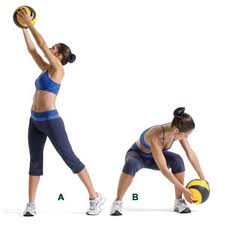A healthy regime is essential
We have had so many players in the academy and healthy living has been one of the weak points of most of them. It's amazing to think that you open a tennis academy and the hardest work you have to do is get the players fit and eating and living healthily. These aren't really tennis things, they should be logical assets for any player to put in his bank before he chances his arm on the tour.

Has your education given you pointers to a healthy life?
One of the real problems on an international academy is that you encounter many different cultures, and this cultural aspect you cannot change overnight, and in fact may be dangerous to change. That means you have to harmonise as far as possible different attitudes to healthy living. Most of the players will claim that they do understand healthy living, it has of course been shown to them by their parents. Now we can firmly pass the blame for most misconceptions onto parents. Children cannot be blamed for the way that they are brought up.
Let's go through some of the main points. You know exactly what sort of things we'll talk about, because this is healthy living tips for everyone, not just for tennis players:-

Mystery of fatigue
. sleep. Most of the players on the academy can be firmly classified as children, and even as a teenager the young body is experiencing hefty changes that frequently goes in phases and jumps. This costs energy, and without knowing it, a young person will fatigue.
Just when the physical stresses start becoming tougher there should be plenty of rest, but also real sleep. Statistics have proven that people are sleeping less than they did a few generations ago. A lot of this is to do with electricity, and the fact that entertainments are available when it is dark. We mustn't be tempted to exploit electricity, instead a regular earlyish bedtime is necessary.
In tournaments sometimes the matches are very late, and then we would deliberately get up later, and develop the habit of playing in the later evenings, but generally breakfast should start at 07 h 00. Before breakfast there is a ten minute workout followed by a shower, so realistically players will be getting up at 06 h 15. Travel to the courts starts at 07 h 45 for a 08 h 30 start. By 11 h 00 the morning training is over. If you don't like these hours you're going to struggle at workouttennis.com.
You may be relieved to hear that there is always a quiet period after lunch, the French siesta! Siestas are essential healthy living, even for young people.

Light Lunch
After a good lunch, nothing will be done until 15 h 00. Afternoon training will start at 16 h 00, so you get another opportunity to sleep for twenty minutes in the afternoon. The evening meal is always a light one and will be eaten at around 18 h 30. On tournament days the afternoon training is scrapped, and a high tea is taken at 16 h 00 ready to travel to the tournaments by 17 h 00. On match days you'll be in bed by 23 h 00, earlier when there is no tournament. This is strict routine, and no player can avoid it. If one player starts living at different times, the whole rythmn of the squad is affected.

Structured living reduces injury risk
. eating. We are confronted now on a daily basis with news about the obesity epidemic. Talk of obesity doesn't belong on a site dedicated to healthy professional athletes, but the fact is that when half the population is technically obese, it is very difficult for an athlete to find a group of people who have correct eating habits.
Already the parents of today's teenagers are obese, which means that at home the family has certain eating habits that the teenagers are following. It would be great to say that this cycle can be broken, because we didn't have this problem two generations ago. We can easily get back to where we were.
The problem is caused by a media that has run rampant on the back of TV and film series, particularly from the USA, making non-stop eating comically acceptable and even fashionable.

Eating habits research for tennis players
I hate to criticise Americans, but they have a lot to answer for on this point.
Every year I have some American students doing a French tour for about a month. They are lovely people, courteous, enthusiastic and dynamic.
However, they don't seem to have a concept of mealtimes, because the whole day is one long mealtime. They carry around with them crisps, chocolate bars and cans of soft drinks that they pick at at will from their rucksacks. How can you educate a whole population who is doing this?
Not only is this excessive sugar consumption totally wrong, and in fact technically, poisonous, for the human body, but the stomach loses its natural ability to fill, digest slowly, release the nutrients and then empty. And remain at rest for a few hours. Our stomachs are designed to remain empty for long periods, and in these periods the body is at its peak physically and mentally. As soon as you fill the stomach with something, the body has to "concentrate " on it, circulate blood to it.
Understanding peak performance
When my players are hitting balls they should be at least an hour after their last meal, and no snacking is allowed unless in emergency. The curiosity is that emergencies do occur, that is when a player simply does not have the energy to continue. I can tell when this is a real emergency, and not just faking!
Healthy muesli bars may be consumed but even these will take twenty minutes to enter the blood stream and muscles.
Tennis is an interminable healthy workout. Enjoy.
When the Americans are in France they do have regular mealtimes organised for them. Because they have been eating all morning, lunch is really just an exercise in moving to a special room to eat. They have no real hunger for a plate that has a small portion of meat, at least two vegetables and some rice or potatoes. This is a serious plate of food, to be enjoyed on the palate, but also the moment when everyone stops for a couple of hours, sits together, and enjoys the relaxing moments of digestion.
Not so for the Americans who will first of all play with their food, pushing aside elements on their plate which they consider having no food value or enjoyment, but, because they are used to eating anyway, they will often just eat it quickly, and then complain that it didn't taste nice. They are in and out of the dining area in a flash.
Speed multitask - periodically, then rest!
I repeat, I hate criticising Americans, they are otherwise such a positive people, and they always make me feel good. But our world has become, and is becoming ever more, Americanised. This is not healthy. In their eating habits, the rest of the world loves to copy them. Beware.
Have A Great Story About This Topic?
Do you have a great story about this? Share it!
